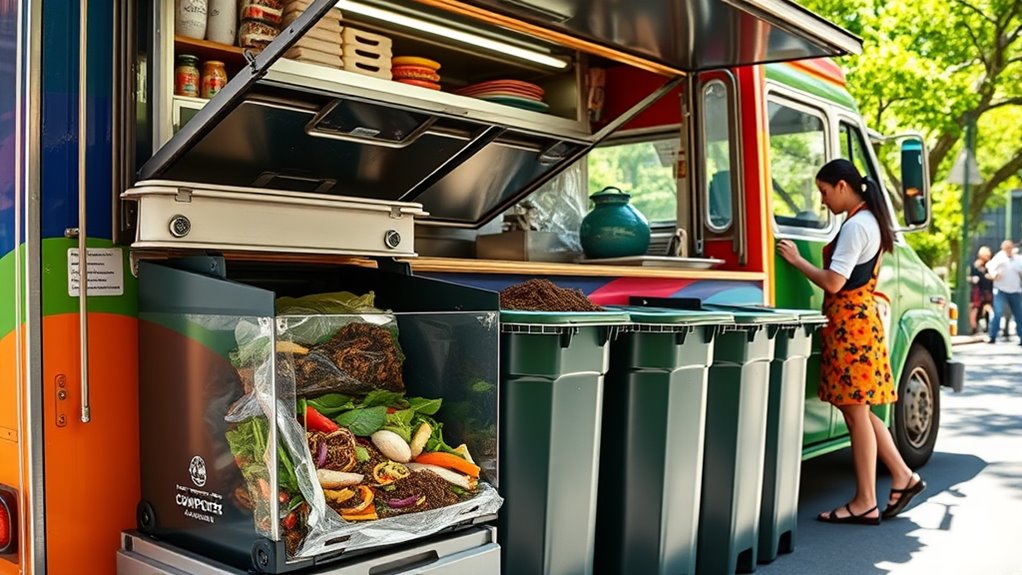To reduce waste and practice composting on your food truck, start by separating food scraps and biodegradable plastics for composting with suitable bins. Use clearly labeled containers for recycling and trash, and educate your staff on proper segregation. Partner with local composting and recycling centers to guarantee proper waste removal. focus on eco-friendly packaging and maintain hygiene through proper waste storage. Keep improving your system—if you’re interested, learn more ways to make your food truck more sustainable.
Key Takeaways
- Separate food scraps and biodegradable plastics for effective composting and reduce landfill waste on food trucks.
- Use clearly labeled bins for recycling, compost, and trash to promote proper waste segregation by staff and customers.
- Select durable, space-efficient compost bins like tumblers or worm bins suited for mobile kitchen environments.
- Train staff on waste sorting, storage best practices, and schedule regular waste pickups to maintain hygiene and efficiency.
- Track waste and recycling data regularly to identify improvement opportunities and demonstrate sustainability efforts.
Understanding the Importance of Sustainability in Food Truck Operations
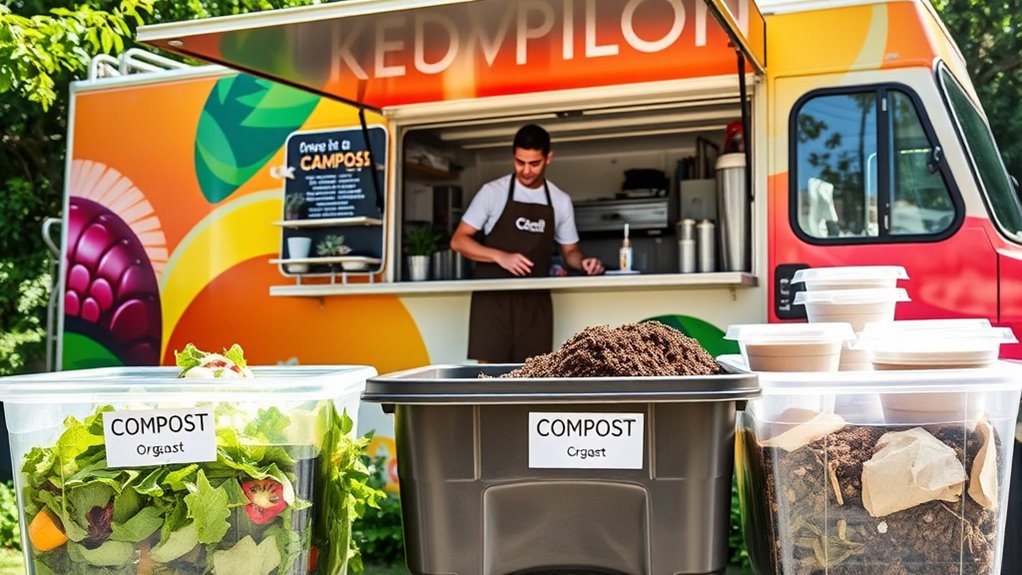
Sustainability is crucial for food truck operations because it directly impacts the environment and your community. By adopting renewable energy sources like solar panels or energy-efficient appliances, you reduce reliance on fossil fuels and lower emissions. Water conservation is equally important; simple steps like installing low-flow faucets or using water-saving techniques help minimize waste. These practices not only protect natural resources but also cut operational costs, making your food truck more sustainable and profitable. Emphasizing sustainability demonstrates your commitment to environmental responsibility, which consumers increasingly value. Incorporating renewable energy and water-saving strategies ensures your food truck remains eco-friendly while maintaining efficient operations. Additionally, understanding juice extraction principles can help you create engaging audio experiences, such as promotional videos or on-site soundscapes, that highlight your commitment to sustainability. Developing sound branding can also reinforce your eco-friendly message and attract environmentally conscious customers. Incorporating space efficiency techniques can further optimize your limited area, reducing clutter and improving workflow. Ultimately, embracing these practices helps you contribute positively to the environment and build a loyal customer base.
Identifying Compostable Materials and Waste Streams
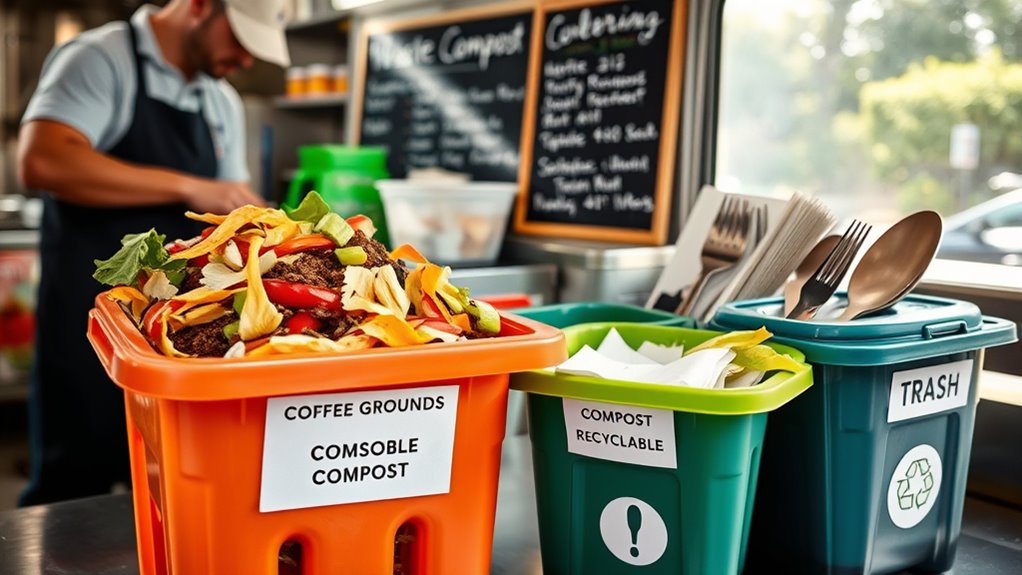
To effectively manage composting and waste reduction, you need to identify which materials are suitable for composting and understand the waste streams generated by your food truck. Focus on separating food scraps, which are rich in organic matter and ideal for composting. These scraps include vegetable peels, coffee grounds, and leftover produce. Additionally, be aware of biodegradable plastics, which can sometimes be composted if they meet specific standards, but others may require special disposal methods. Recognizing these materials helps you reduce landfill waste and ensures composting efforts are efficient. Keep track of all waste streams to determine the volume and type of waste produced, enabling better planning for composting and waste management strategies. For reliable waste management, consider using vacuums designed for various surfaces, ensuring proper cleanup of food debris and maintaining a hygienic environment.
Setting Up a Composting System for Mobile Kitchens
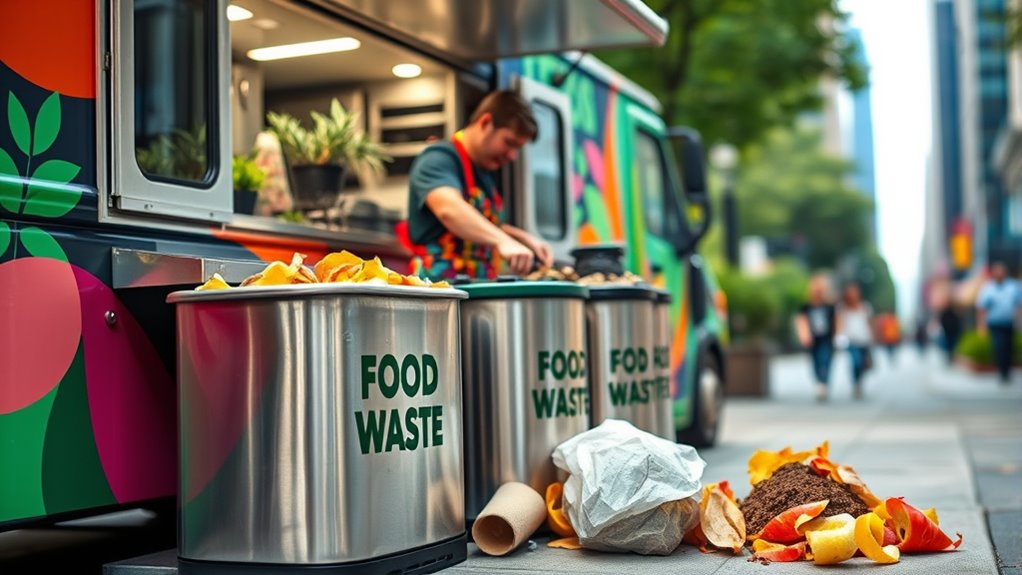
To establish a composting system in your mobile kitchen, you need to select the right compost bins that fit your space and needs. Managing food waste properly guarantees efficient composting and minimizes odors. Additionally, storing materials correctly helps keep the system clean and ready for use on the go. To enhance compost quality, consider exfoliation of waste materials to break down organic matter more effectively. Recognizing the importance of waste reduction can further improve your sustainability efforts and reduce overall waste produced by your food truck. Incorporating materials needed for composting strategies by engaging staff in maintaining the system can also foster a sense of teamwork and responsibility. Utilizing appropriate storage techniques ensures that compostable materials remain uncontaminated and accessible when needed.
Selecting Compost Bins
Choosing the right compost bin is essential for setting up an efficient composting system in your mobile kitchen. You’ll want a bin that’s durable, easy to clean, and suited to your space. Consider different compost bin types, such as tumblers, stationary bins, or worm bins, each offering unique benefits. For example, tumblers are quick and easy to turn, while stationary bins work well in limited spaces. To keep waste organized, use recycling bins for non-compostables and dedicated compost bins for food scraps. Here’s a quick comparison:
| Compost Bin Types | Features |
|---|---|
| Tumbler | Fast composting, easy turning |
| Stationary | Space-efficient, simple design |
| Worm Bin | Vermicomposting, odor control |
Choose based on your space, waste volume, and maintenance preference. Incorporating composting education can improve waste management practices and encourage sustainability in your food truck operations, ensuring proper waste reduction strategies are followed. Additionally, selecting a bin that promotes easy maintenance can help streamline the composting process and reduce ongoing effort. Regularly monitoring and maintaining your compost system helps prevent issues like odors or pests, making the process more efficient and sustainable. Moreover, understanding the benefits of composting can motivate staff and enhance environmental responsibility in your mobile kitchen.
Managing Food Waste
Setting up a composting system for your mobile kitchen involves organizing your food waste efficiently and ensuring it’s properly managed. A well-designed system supports your food truck branding by highlighting eco-friendly practices. To get started, consider:
- Separating compostable waste from regular trash
- Using compact, portable compost bins that fit your mobile kitchen design
- Training staff on proper waste sorting techniques
- Scheduling regular waste collection to prevent odors and pests
- Incorporating necessary cookies to monitor the effectiveness of your composting practices and improve overall waste management efficiency. Additionally, understanding food waste reduction strategies can significantly enhance your sustainability efforts. Implementing risk assessment methods can help identify potential issues early and ensure your composting system remains compliant with local regulations.
Ensuring Proper Storage
Ensuring proper storage is essential for maintaining an effective composting system in your mobile kitchen. Proper storage involves keeping compost materials in a designated area that prevents contamination and odors. Use sealed containers or compost bins to avoid pests and leaks, especially during transport. Temperature control is critical; maintain a cool environment to slow decomposition and prevent unpleasant smells. Consider insulating storage spaces or using portable cooling solutions if necessary, especially in warm climates. Label containers clearly and keep them away from food prep zones to prevent cross-contamination. Regularly check stored materials for signs of spoilage or pest activity. Additionally, monitoring vetted conditions ensures your system remains efficient, sanitary, and compliant with health standards while minimizing disruptions during your food truck operations. Incorporating proper sanitation practices further supports maintaining a hygienic environment and prolongs the effectiveness of your composting setup.
Choosing Eco-Friendly Packaging and Utensils
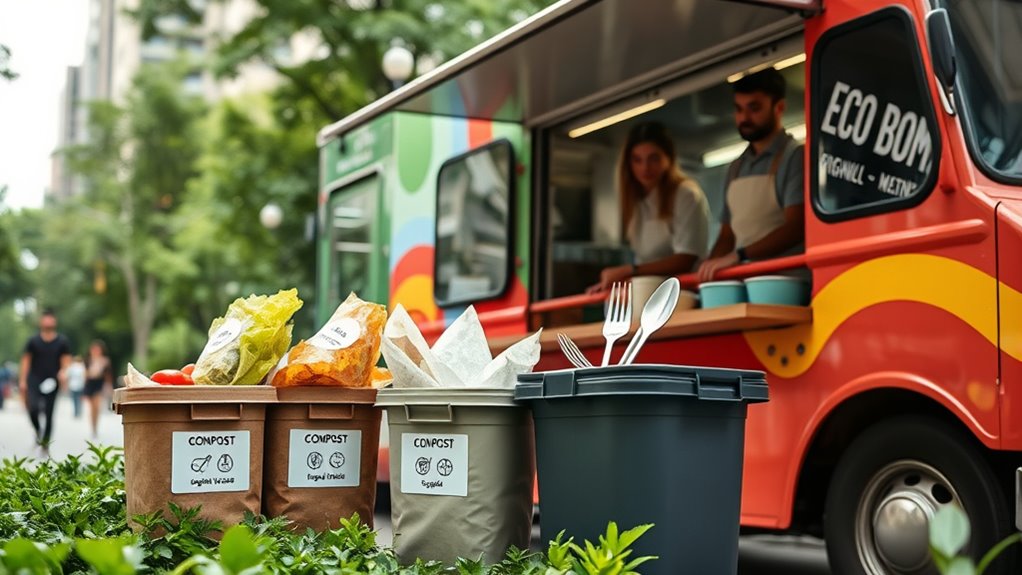
Opting for eco-friendly packaging and utensils is a simple yet impactful way to reduce waste. Using biodegradable cutlery and eco-friendly packaging helps minimize your environmental footprint and appeals to eco-conscious customers. When choosing supplies, consider these options:
- Biodegradable cutlery made from cornstarch or bamboo
- Compostable containers for hot and cold foods
- Reusable or recyclable napkins and wraps
- Packaging made from recycled materials
- Incorporating plant-based materials in your packaging can further enhance sustainability efforts and appeal to environmentally aware consumers. Additionally, selecting suppliers committed to sustainable sourcing ensures your entire supply chain supports environmental responsibility.
Switching to these options not only cuts down on landfill waste but also promotes sustainability. Your customers will appreciate your commitment to the environment, which can boost your reputation. Remember, small changes like these add up over time, creating a more sustainable food truck operation and encouraging responsible waste management.
Implementing Waste Segregation and Recycling Practices
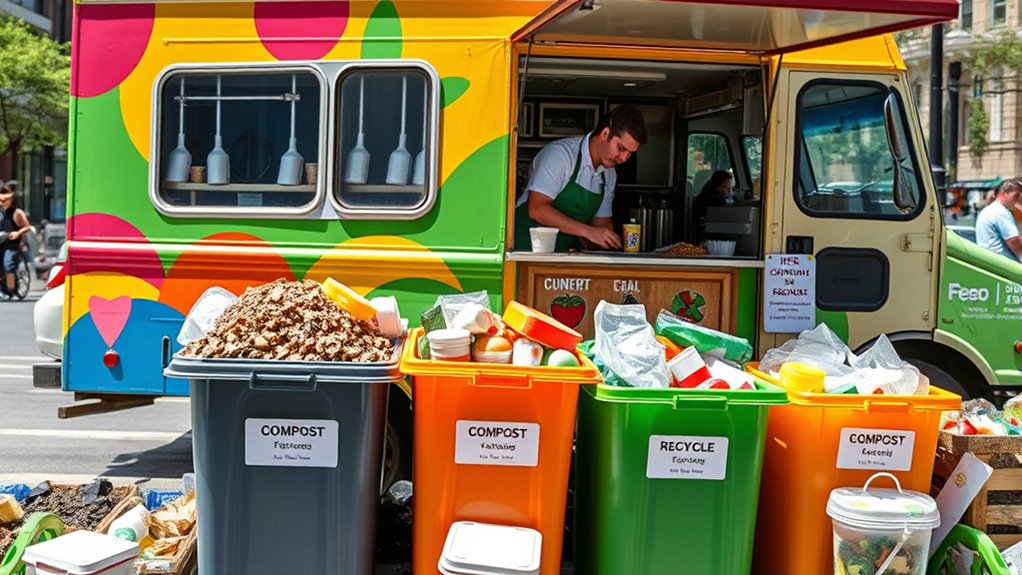
Implementing waste segregation and recycling practices is essential for effectively managing your food truck’s waste and reducing environmental impact. Start by providing clearly labeled bins for recyclables, compostables, and trash, making it easy for staff and customers to sort waste correctly. Incorporate recycling education into your routine, explaining the importance of proper segregation and how it benefits the environment. Use waste tracking to monitor how much you recycle versus trash, helping identify areas for improvement. Keep a simple chart like this:
| Waste Type | Disposal Method |
|---|---|
| Plastics & paper | Recycling bins |
| Food scraps | Composting (if available) |
| Other waste | Trash bin |
Consistent practice guarantees your food truck minimizes landfill contributions and promotes eco-conscious habits.
Partnering With Local Composting and Recycling Facilities
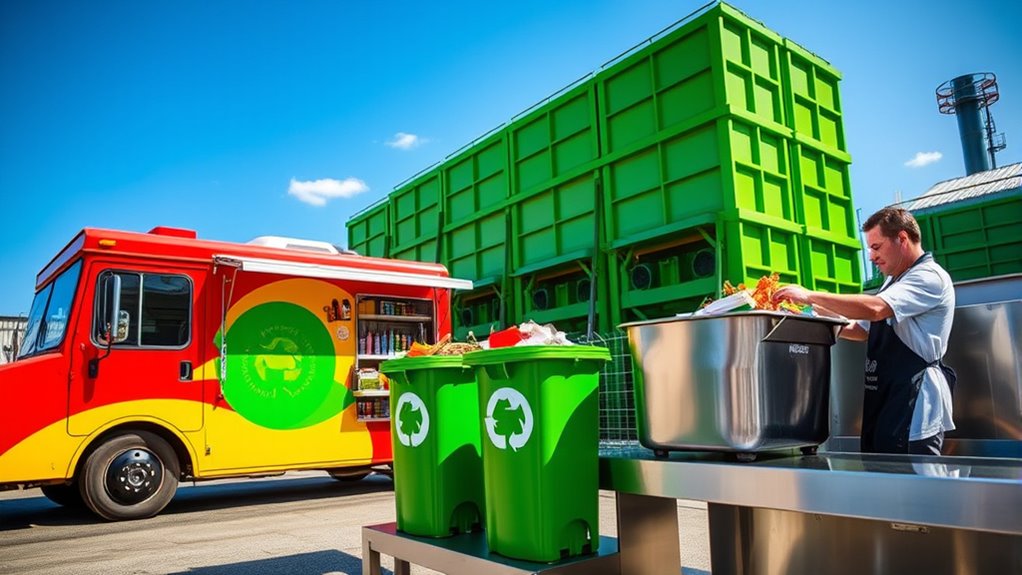
Partnering with local composting and recycling facilities helps streamline your waste reduction efforts. You’ll need to identify nearby partners, coordinate pickup schedules, and guarantee waste is properly sorted. Clear communication and planning are key to making these partnerships effective and sustainable.
Identifying Local Partners
How can you effectively identify local composting and recycling facilities to support your waste reduction efforts? Start by researching online directories, local government resources, and environmental organizations. Attend community outreach events to network with potential partners. Reach out to local business collaborations that focus on sustainability—they often have established relationships with recycling centers. Consider visiting facilities in person to assess their capabilities and compatibility with your food truck’s needs. Building strong relationships with these partners ensures smooth waste management. Keep in mind, clear communication and shared goals are essential for successful collaboration. By proactively engaging with local composting and recycling centers, you can create a reliable waste reduction system that benefits your business and the environment.
Coordinating Pickup Schedules
Coordinating pickup schedules with local composting and recycling facilities is essential to guarantee your waste is managed efficiently and without disruption to your operations. You need to establish clear pickup coordination and ensure your schedules align with the facility’s availability. Effective scheduling logistics help prevent overflow and minimize downtime, keeping your food truck running smoothly. Communicate regularly with your partners to confirm pickup times and adapt to any changes in their operations. By planning pickups in advance and maintaining consistent contact, you reduce the risk of missed collections or delays. This proactive approach streamlines waste management, keeps your environment clean, and supports your sustainability goals. Proper coordination ensures that waste removal becomes seamless, allowing you to focus on serving your customers.
Ensuring Proper Waste Sorting
Are you making certain your waste is sorted correctly before it leaves your food truck? Proper waste sorting ensures materials go to the right facilities and prevents contamination. Partnering with local composting and recycling centers helps streamline this process. Be sure to:
- Separate food scraps from recyclables like plastics and metals
- Properly dispose of recycling electronics to prevent environmental harm
- Manage hazardous waste, such as cleaning chemicals, according to regulations
- Use clearly labeled bins to guide staff and vendors in sorting waste correctly
Educating Staff and Customers on Waste Reduction Initiatives
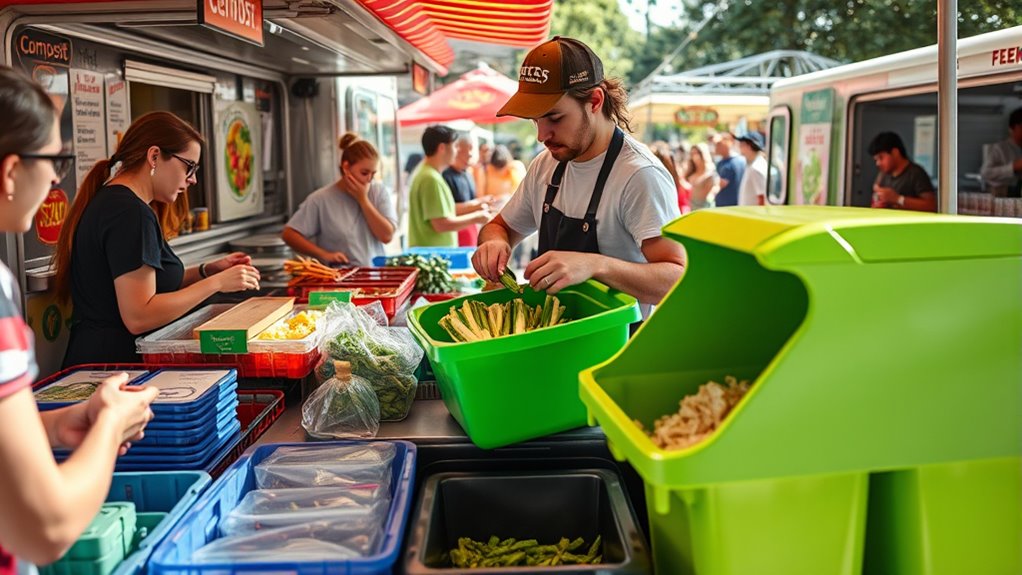
Educating staff and customers about waste reduction initiatives is essential for fostering a sustainable environment. Your efforts in customer engagement and staff training ensure everyone understands the importance of waste reduction. When customers see clear signage and receive quick explanations, they’re more likely to participate actively. Staff training equips your team to communicate waste practices confidently and handle questions effectively. Consider this approach:
| Strategy | Benefit |
|---|---|
| Staff workshops | Enhance knowledge and improve waste handling skills |
| Informative signage | Reinforces waste reduction practices visually |
| Customer engagement programs | Encourages participation and awareness |
Monitoring and Improving Your Sustainability Efforts

To effectively enhance your sustainability efforts, you need to implement ongoing monitoring systems that track your progress and identify areas for improvement. Digital tracking tools enable you to gather real-time data on waste reduction and composting performance. By analyzing sustainability metrics, you can see how your initiatives impact your environmental footprint and identify opportunities for optimization. Regularly reviewing this data helps you stay accountable and adjust strategies accordingly. Consider tracking:
- Waste diversion rates
- Composting participation levels
- Resource consumption patterns
- Customer feedback on eco-friendly practices
Using these insights, you can refine your approach, set measurable goals, and demonstrate your commitment to sustainability, ensuring continuous improvement on your food truck’s eco-efficiency.
Frequently Asked Questions
How Can Food Trucks Incentivize Customer Participation in Composting?
To boost customer engagement, you can implement incentive programs that encourage participation in composting. Offer discounts, loyalty points, or small freebies for customers who bring their compostable waste or use designated bins. Make sure to clearly communicate these incentives through signage and staff interaction. By making composting easy and rewarding, you motivate more customers to join your sustainability efforts and create a positive, eco-friendly experience on your food truck.
What Are Cost-Effective Methods for Maintaining Compost Systems on Mobile Kitchens?
Maintaining compost systems on your food truck might feel like juggling flaming torches, but it’s doable! Position your compost bin strategically for easy access and to minimize space issues. Use odor control techniques like charcoal filters or sealed lids to keep smells at bay. These cost-effective methods help you keep your mobile kitchen eco-friendly without breaking the bank, ensuring your compost system runs smoothly and efficiently.
How Do Weather Conditions Affect Composting and Waste Management on Food Trucks?
Weather conditions directly impact your waste management efforts. Rain can cause compost bins to become overly moist, leading to odors and pests, so you should use rain impact barriers or covers. Wind mitigation is essential to prevent debris from scattering and to protect your compost area. By proactively managing these elements, you keep your waste system functioning smoothly, ensuring cleanliness and compliance while minimizing potential disruptions caused by weather.
Are There Specific Regulations for Composting Waste From Food Trucks?
They say, “Knowledge is power,” and that’s true here. You need to check local composting regulations because rules vary by city. You also must secure the proper food truck waste permits before starting composting. Staying compliant guarantees you avoid fines and penalties, keeping your operation smooth. Always stay informed about specific requirements so you can responsibly manage waste and contribute to a greener environment.
How Can Food Trucks Track and Report Their Sustainability Progress Effectively?
You can track and report your sustainability progress effectively by implementing digital tracking systems that monitor waste reduction, energy use, and other eco-friendly practices. Use data visualization tools to create clear, visual reports of your progress, making it easier to identify areas for improvement. Regularly update your data and share insights with your team and customers to demonstrate your commitment and motivate ongoing sustainable efforts.
Conclusion
By embracing composting and waste reduction, you transform your food truck into a rolling beacon of sustainability. Every mindful choice is like planting seeds for a greener future, turning trash into treasure along your journey. With dedication, you’ll steer your operation toward harmony with the environment, proving that even on the go, you can make a lasting, positive impact. Keep pushing forward—your commitment fuels change like a well-oiled engine powering a cleaner planet.
